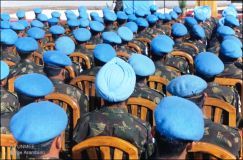UN chief to relocate peacekeepers if Eritrea maintains fuel blockade
By Tesfa-alem Tekle
February 4, 2008 (UNITED NATIONS) – The UN chief has said the mission will start relocating from Eritrea if Asmara does not allow U.N. personnel access to fuel by Wednesday.
 Eritrea cut off fuel supplies to UNMEE troops on its side of the border in December, forcing them to drastically reduce patrols and demining activities.
Eritrea cut off fuel supplies to UNMEE troops on its side of the border in December, forcing them to drastically reduce patrols and demining activities.
Ban Ki-Moon, in a letter to the Security Council last Friday, pointed out that the Mission’s fuel stocks will run out in the coming few days, leaving only the strategic reserves, which are intended exclusively for emergency evacuation purposes.
On Wednesday January 30, the UN Security Council, in Resolution 1798 has approved the extension of the United Nations Mission in Ethiopia and Eritrea (UNMEE) for another six months, but expressed concern over the lack of progress in efforts to resolve heightened tensions over their border dispute between the two countries.
The Security Council demanded that the Eritrean Government “resumes immediately fuel shipments to UNMEE or allows UNMEE to import fuel without restrictions.”
The Secretary-General said that if the Eritrean authorities do not reinstate the fuel supplies by 6 February, he will be compelled to instruct UNMEE to begin relocating the mission personnel and equipment from Eritrea, to avoid a total immobilization of the Mission and endangering the safety and security of UN personnel.
UNMEE, which has been monitoring the 2000 ceasefire that ended the border war between the two countries, has not been able to obtain fresh supplies of fuel in Eritrea since 1 December last year, according to the acting head of the Mission.
“These restrictions are paralyzing the mission and its movements and making the living conditions of our civilian and military staff on the ground extremely difficult,” Azouz Ennifar said just over a week ago.
The 1700 strong UN mission in Ethiopia and Eritrea went operational in 2000 after, Ethiopia and Eritrea signed an Agreement on Cessation of Hostilities on 18 June 2000 in Algiers.
The 15-member body today once again voiced its concern about the fact that the fuel restrictions have not yet been lifted. Ambassador Ricardo Alberto Arias of Panama, which holds the rotating presidency this month, said the Council reiterated its demand that Eritrea “forthwith and without preconditions lifts its restrictions on fuel deliveries so that UNMEE be in a position to execute its extended mandate.”
The Council also requested Eritrea to facilitate a UN technical assessment mission which is due to depart for the region tomorrow.
An independent commission charged with marking the border after the war awarded the flashpoint town of Badme to Eritrea in 2002, but Ethiopia did not withdraw. In November, the commission demarcated the line by map coordinates in a ruling that Eritrea accepted but Ethiopia rejected.
(ST)
